 Top 10 Natural Remedies to Stop Snoring
Top 10 Natural Remedies to Stop Snoring
Snoring is the most common of all sleep issues, affecting both men and women. While occasional snoring is a natural occurrence that most people experience, it is a chronic problem for some. It can also be sign of an underlying health condition.
Snoring occurs during sleep when the muscles of the throat relax and your tongue falls backwards. With a more narrow and floppy airway, your throat vibrates or rattles when you breathe creating a noisy, hoarse or harsh sound.
Often people who snore get fragmented and unrefreshing sleep. This can lead to sleep deficiencies that can negatively impact you and your partner.
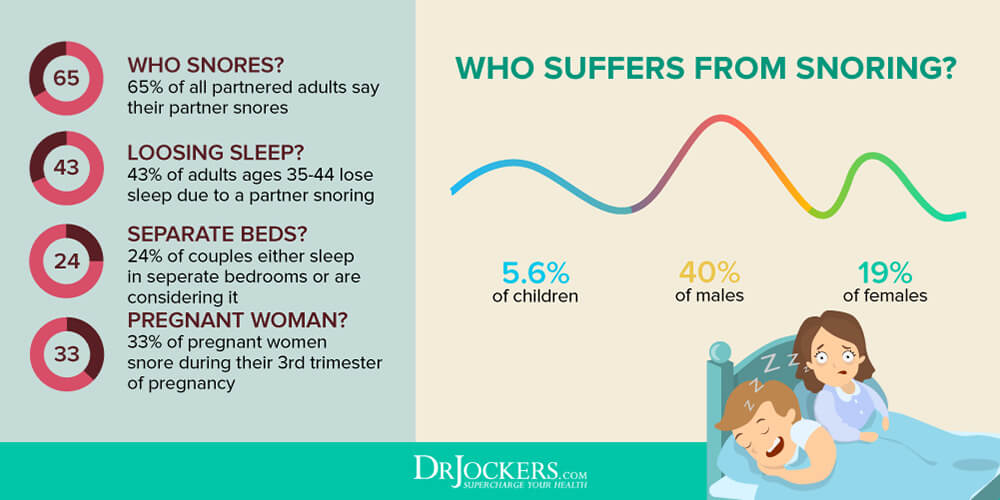
Common Causes
People with enlarged tonsils, a deviated nasal septum, nasal polyps, or an elongated uvula have narrower airways which leads to snoring. Having nasal congestion or inflammation from a respiratory infection or seasonal allergies can contribute as well.
There are many lifestyle factors that contribute. Excess weight and poor muscle tone in the throat area can cause snoring. Sleeping on your back can make it worse. Drinking alcohol, smoking, and using sedatives can also lead to congested or overly relaxed airways that promote this issue.
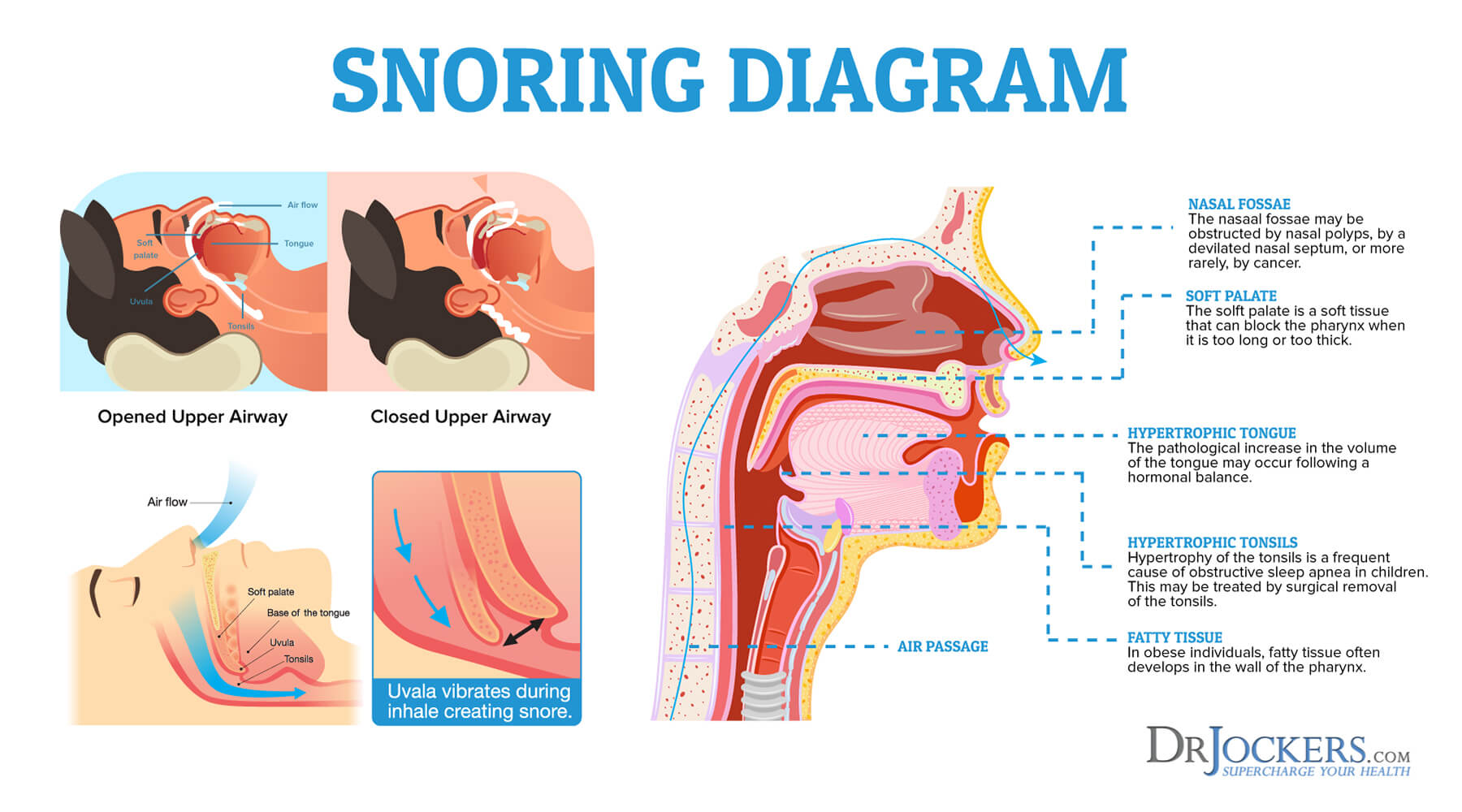
What is Snoring and Who Does It Affect?
Snoring affects approximately 90 million adults (1). About 40% of adult men and 20% of adult women chronically snore (2).
While you are sleeping, the muscles of your throat relax, your tongue falls back, and your throat narrows. As you breathe, the walls of your throat can vibrate.
Snoring is the fluttering sound created by the vibration of tissues against each other in the back of the nose and throat. The narrower a person’s airway (due to different factors), the greater the vibration of tissues. The greater the vibration, the louder the sound.
Whether it wakes you up or not, snoring can significantly decrease the quality of your sleep. It reduces air intake and can result in sleep apnea and chronic sleep deprivation.
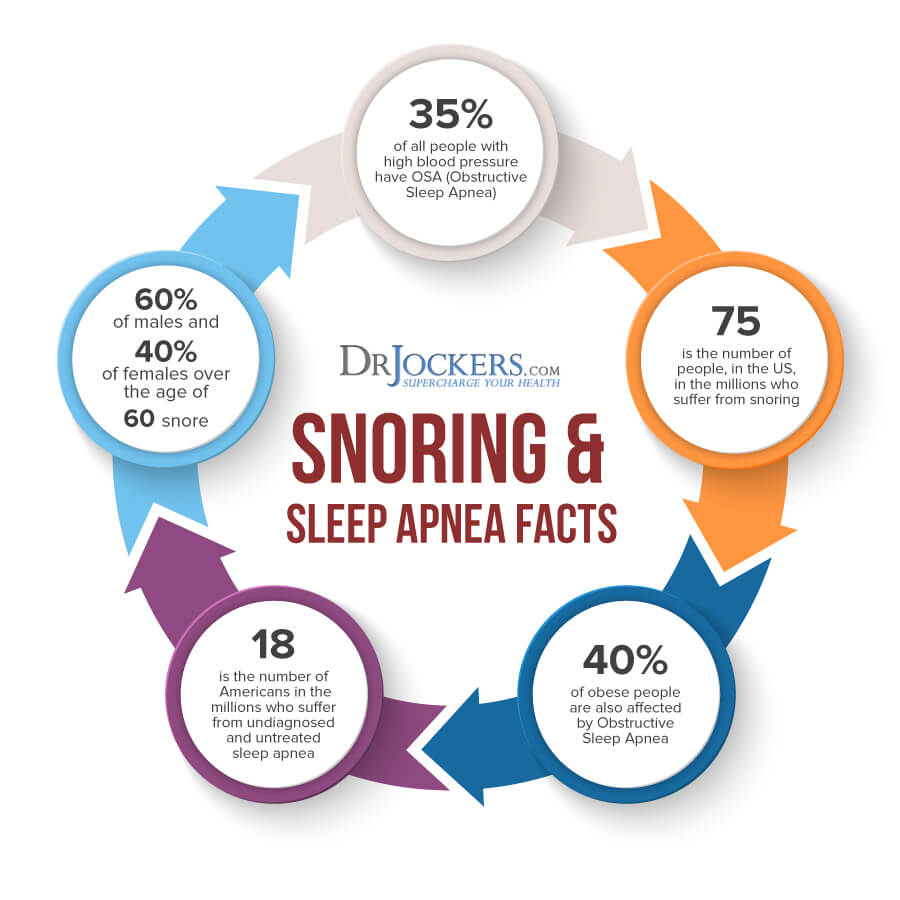
Causes and Risk Factors for Snoring
There are several factors that can cause or contribute to snoring. Lifestyle factors as well as anatomical and functional issues can be involved.
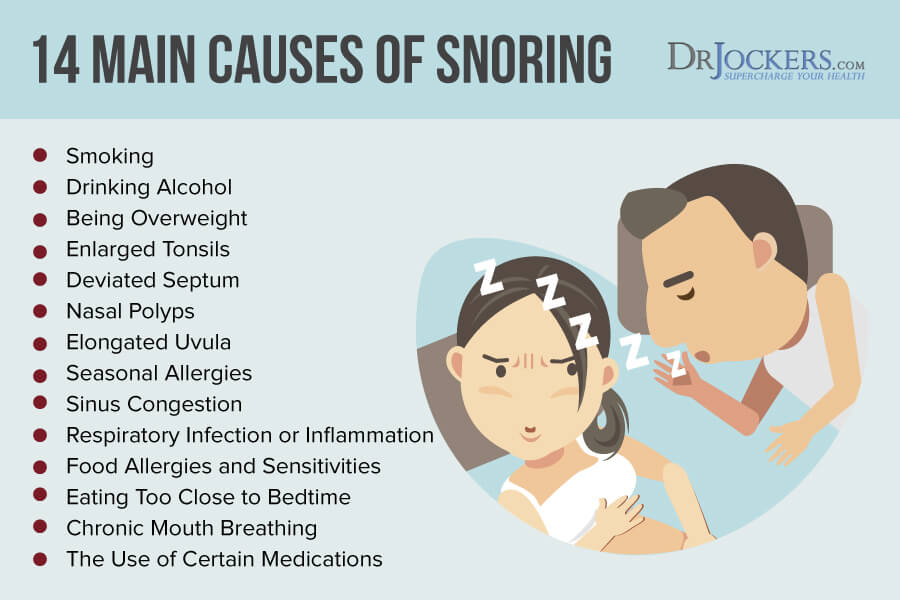
Factors other than Lifestyle
Aging is one factor that contributes to snoring. As you age, your throat becomes narrower and the muscle tone in your throat decreases. While aging is a part of life, using the strategies below can help reduce or prevent these changes that lead you to snore.
Snoring can be a result of anatomical abnormalities in your mouth and sinuses (3). Enlarged tonsils, nasal polyps, a deviated nasal septum, or an elongated uvula can all contribute. These abnormalities can obstruct airflow during sleep.
Inflammation of the nose and throat from a respiratory infection or seasonal allergies can be a potential cause. Nasal congestion commonly contributes to the issue because of the blocked airflow.
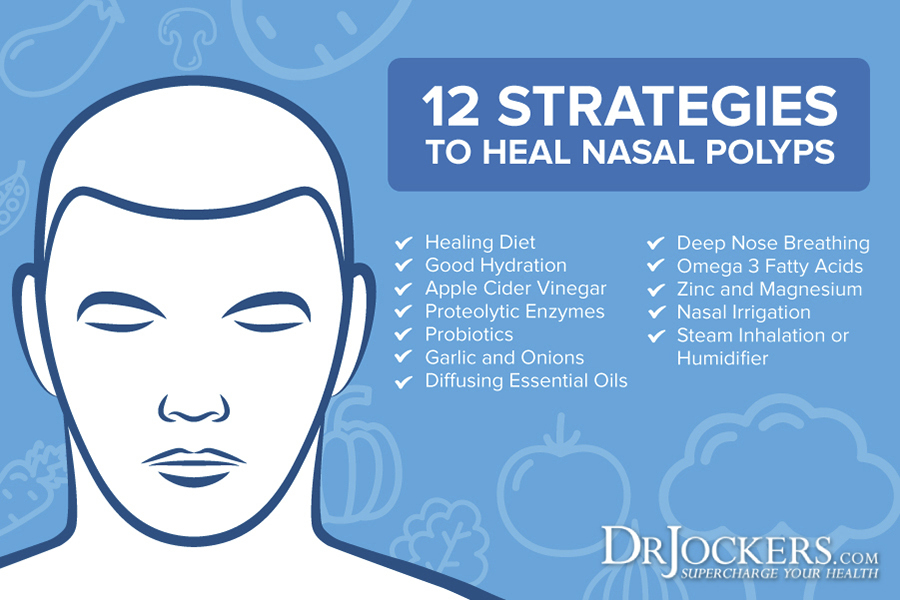
Lifestyle Factors For Snoring
Excess weight is one of the main causes of snoring. Excess weight leads to fatty tissue and poor muscle tone around the neck and throat. This causes the throat to narrow.
Sleeping on your back and poor sleep hygiene can also contribute. Chronic mouth breathing is another lifestyle factor associated with snoring. Consuming dairy products and eating large meals at night can also make the issue worse.
Drinking alcohol and smoking both increase the likelihood that you will snore. Alcohol relaxes the muscles of the upper airway, which can become floppy and make noise as you breathe. Alcohol also lowers your natural defenses against snoring. Smoking irritates the tissues in the throat leading to inflammation.
Many people who snore rely on sleeping pills and antihistamines at bedtime. Rather than helping people sleep, these sedatives can cause more snoring as they depress the respiratory system.
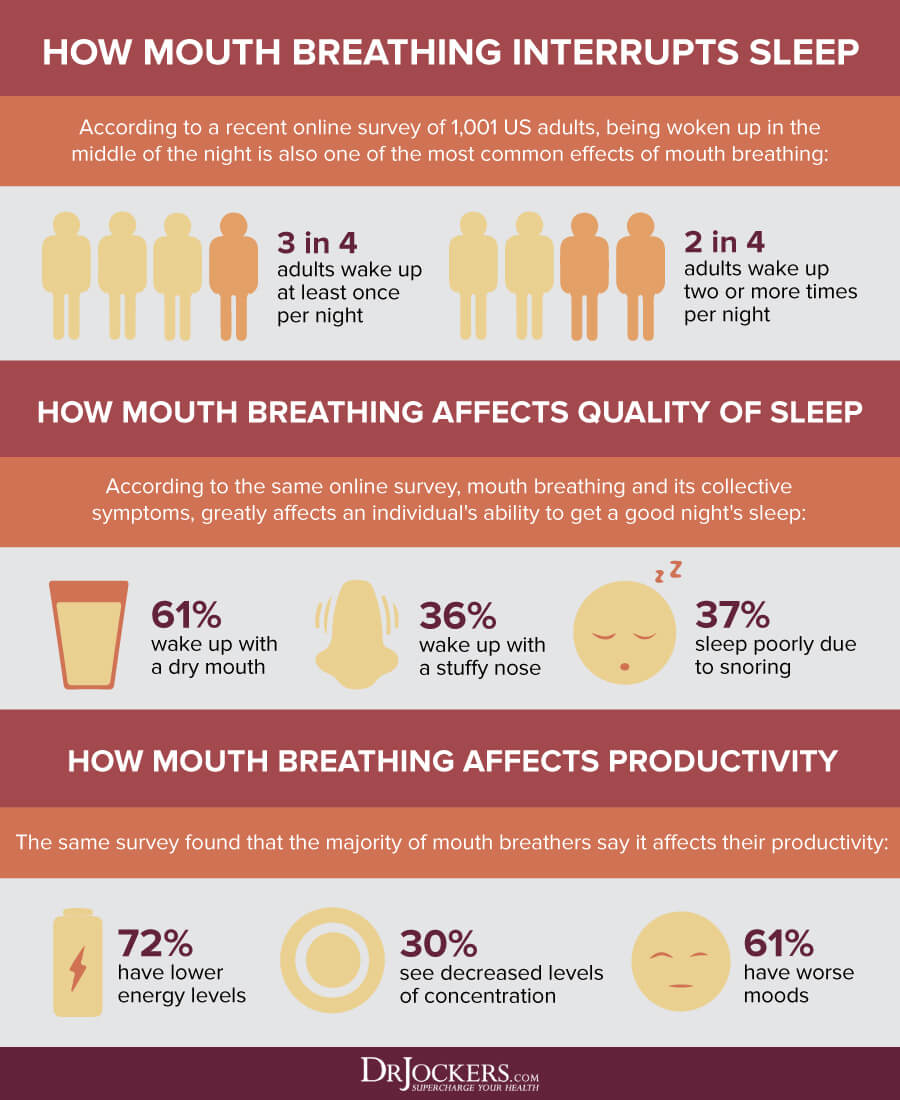
Sleep Apnea as an Underlying Cause For Snoring
Severe snoring can be due to sleep apnea. Sleep apnea is a serious condition where breathing is interrupted or paused during sleep. People with sleep apnea may gasp or choke at night.
Symptoms of sleep apnea are excessive daytime sleepiness, morning headaches, and unrefreshing sleep (you wake in the morning not feeling rested). Other symptoms of sleep apnea are difficulty with concentration or memory and poor attention span. It is important to see a doctor if you have sleep apnea.

How Snoring Affects Your Health
Snoring indicates that something is wrong with the way you are breathing as you sleep. The two main health issues associated with snoring are daytime dysfunction from fragmented sleep and sleep deprivation.
Snoring causes poor sleep quality and sleep deprivation, both for the person who snores and their partner. Poor sleep quality causes blood sugar imbalances, increases inflammation, and increases cortisol secretion.
Ongoing sleep deficiencies have been linked to increased risk of heart disease, kidney disease, high blood pressure, diabetes, stroke, and obesity. Sleep is imperative for our immune and digestive systems to function properly. Fortunately, there are natural ways to reduce this sleep issue.
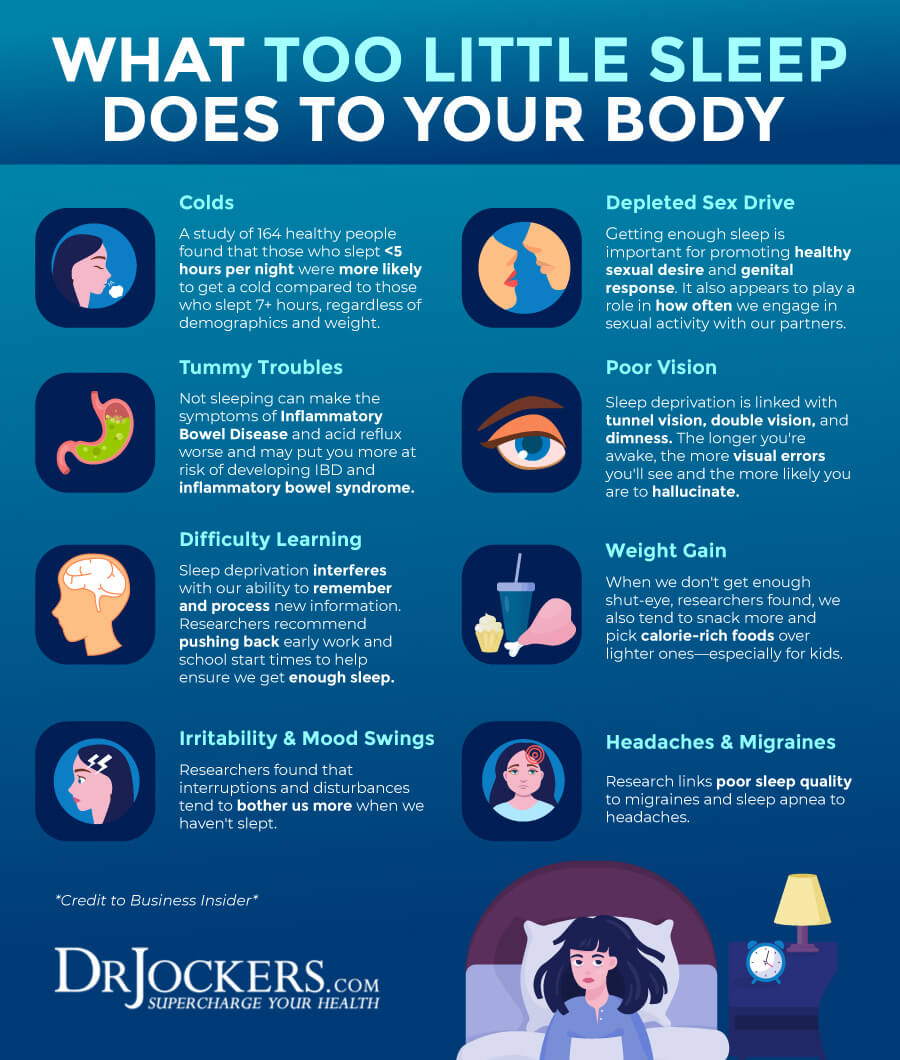
10 Natural Strategies to Stop Snoring
There are many strategies you can implement to stop or improve snoring.
These strategies include following an anti-inflammatory, healing diet, removing food sensitivities, losing excess weight, intermittent fasting, consuming smaller meals at night, avoiding dairy, diffusing essential oils, mouth taping, changing your sleep position, practicing good sleep hygiene, and avoiding alcohol, smoking and sedatives.
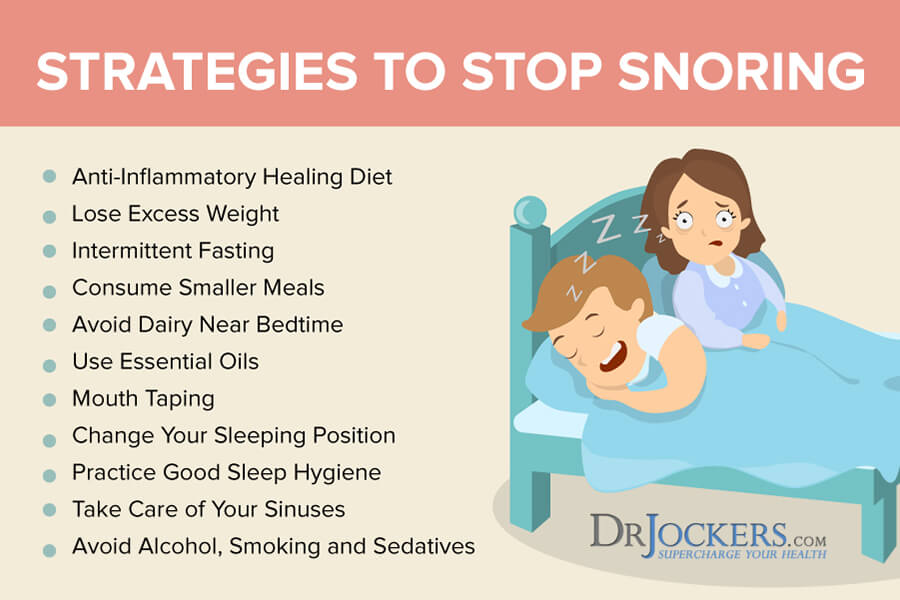
Anti-Inflammatory Healing Diet
One of the best strategies for reducing or preventing snoring is implementing an anti-inflammatory, healing diet. This would include removing any foods to which you may have a sensitivity or intolerance.
A healing diet reduces inflammation, stabilizes blood sugar, reduces toxic load, provides necessary nutrients, and supports healthy blood pH levels.

Foods to Remove
A healing diet removes foods that cause inflammation. Inflammatory foods are refined sugars and grains, and any foods that are easily metabolized into sugar (high glycemic foods).
Meat and dairy from conventionally-raised animals, farmed fish, processed foods and highly processed vegetable oils, such as canola, soybean, cottonseed and safflower, should also be eliminated. These foods increase inflammation and create extra acidity in the tissues.

Foods to Include
Foods to include in the anti-inflammatory healing diet are organic, non-GMO, whole, unprocessed foods. Grass-fed, pasture-raised meats and wild-caught fish are excellent sources of protein. Consume a variety of lower carbohydrate, low glycemic, colorful vegetable and fruits for their abundant antioxidants and phytonutrients. Herbs should be used in abundance for their many healing properties.
Lower carbohydrate vegetables are vegetables such as leafy greens, cruciferous vegetables, leeks, shallots, cucumbers, and asparagus. Low glycemic fruits to include are berries, lemons and limes, grapefruit, and granny smith apples.
Healthy fats are a very important part of a healing diet. Healthy fats are found in coconut, olives, avocados, and their oils and in grass-fed butter and ghee. Omega-3 fatty acids and conjugated linoleic acid (CLA) found in wild caught salmon and grass-fed beef and dairy have many health benefits. These healthy fats are an efficient source of fuel for the body to combat inflammation and support brain function.
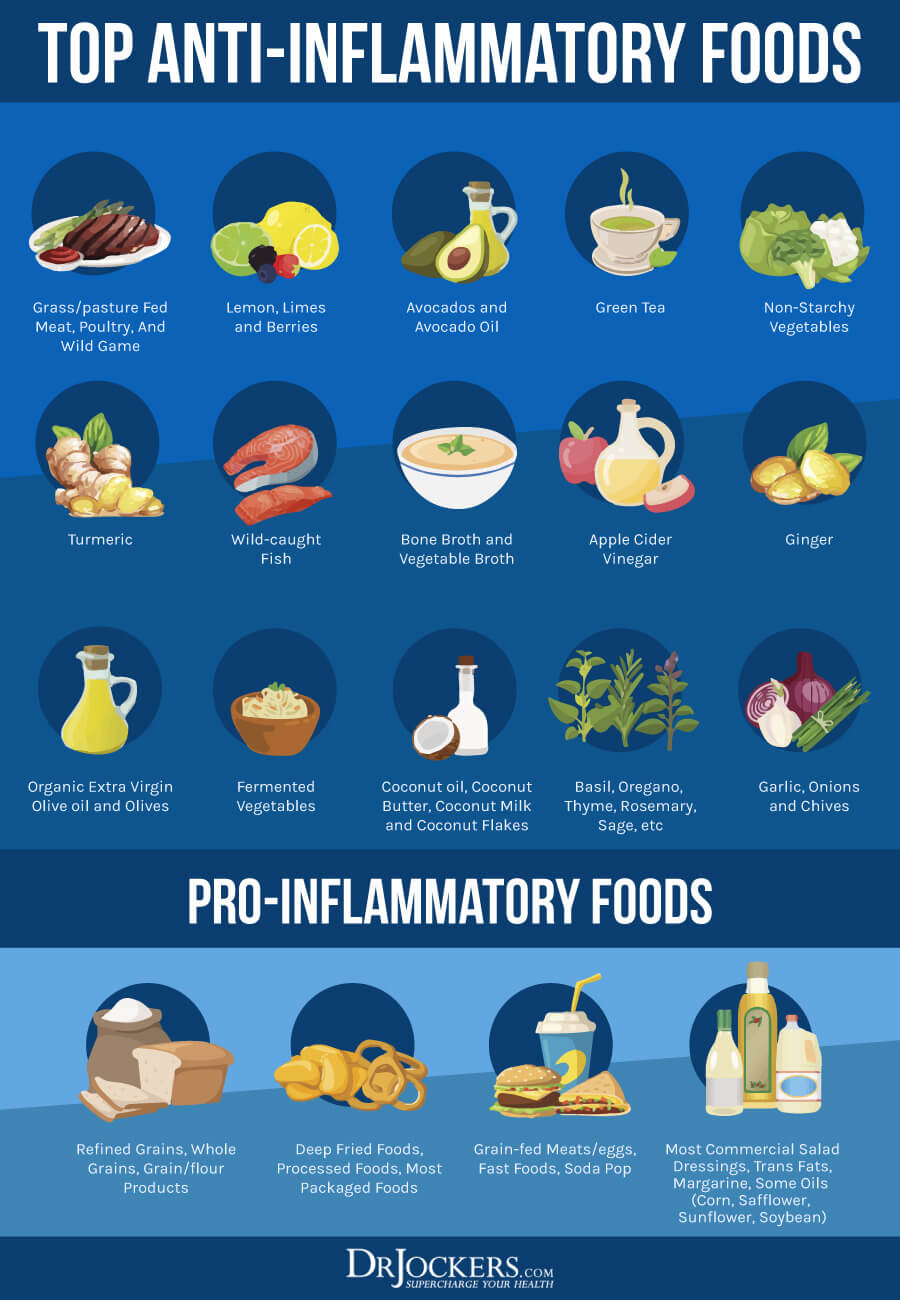
Eliminate Food Sensitivities
As part of your anti-inflammatory, healing diet, it is critical to eliminate foods to which you are sensitive or cannot tolerate. At least 25% of people in the United States have food sensitives.
Food sensitivities cause an inflammatory spiral that can be detrimental to your health. The most common food allergies and intolerances include wheat and gluten, soy, corn, dairy, fish, shellfish, eggs, peanuts, and tree nuts.


Lose Excess Weight
Losing excess weight and toning your muscles are important strategies to prevent or stop snoring. Fatty tissue and poor muscle tone around the neck and throat can cause the throat to narrow and contribute to snoring. Losing weight can shrink your neck size and may help reduce or even stop snoring.
There are many steps you can take to lose the excess weight. Healing a leaky gut and balancing your gut microbiome are important first steps for weight loss.
Following the anti-inflammatory, healing diet outlined above is a powerful way to lose excess weight, reduce inflammation and balance hormones that can contribute to weight gain. You should also practice intermittent fasting daily to help burn excess fat.
Exercise, particularly high intensity interval exercise, is important for maintaining a healthy weight and improving muscle tone. This is important because poor overall muscle tone and overly relaxed muscles contribute to snoring.
To perform high intensity exercises, you should do the exercises in sequence, for short time periods with little rest between sets. You should incorporate full body movements such as squats and push-ups. High intensity exercise increases fat-burning and anti-aging hormones for the next 36 hours.
Many people are unable to maintain a healthy weight despite exercise and dieting. This is due to insulin resistance. Weight gain, particularly abdominal fat, is a classic sign of insulin resistance and chronic inflammation. Low levels of vitamin D3 are also associated with cellular inflammation and weight loss resistance (4). These issues must be addressed to lose excess weight.
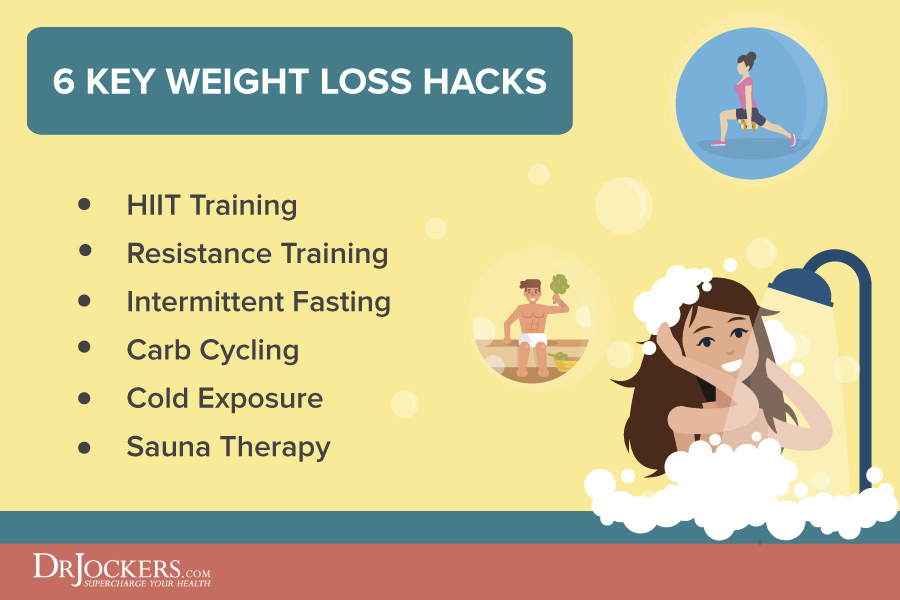
Intermittent Fasting
Intermittent fasting has many amazing health benefits in addition to burning fat. These benefits include boosting the immune system, stimulating cellular autophagy, improving genetic repair mechanisms, improving insulin sensitivity, and reducing the risk of chronic diseases (5). Intermittent fasting is a foundational healing and performance strategy that you should implement daily.
The best approach to intermittent fasting is to tart with a simple fast of 12 hours for 1-2 weeks and see how your body responds. This short fast is basically from dinner until breakfast the next day (for example 7 pm to 7 am). From there, you can increase your fasting time as your body adapts to not eating at certain times of the day.
Other types of intermittent fasting are the Cycle Fast (16 hour fast, 3 times a week), the Strong Fast (16-18 hours a day), the Warrior Fast (19-21 hours a day), and the One Day Fast (24 hour fast one day each week). For detailed information on the best fasting strategies, read this article.

Consume Smaller Meals and Avoid Dairy Around Bedtime
You should avoid heavy meals or snacks at least three hours before going to bed. Eating a large meal can strain your digestive system. A full stomach also pushes up against your diaphragm and affects your breathing.
Consuming milk or other dairy products can worsen snoring. Dairy products leave a layer of mucous in your mouth and throat. This keeps your nasal passages from draining properly, blocking your airways and contributing to snoring.
Use Essential Oils
An effective strategy for improving snoring is to use essential oils. Essential oils such as eucalyptus, tea tree, peppermint, and clove have healing properties and can help break up mucus and reduce inflammatory responses. This will make breathing easier and help you stop snoring.
Peppermint is an amazing herb that contains rosmarinic acid. Rosmarinic acid has antioxidative activities, blocks the production of pro-inflammatory chemicals, and encourages cells to produce key molecules that keep the airways open for easy breathing (6).

Ways to Use Essential Oils
There are many ways you can use essential oils. You can diffuse oils in a diffuser, inhale them, or apply the oils topically. You can also ingest certain oils, just be sure to research proper amounts and instructions.
For snoring, a great strategy is to put an essential oil diffuser next to your bed and run the diffuser while you sleep. Add 3-4 drops of essential oils to half a cup of water.
You can also inhale or apply essential oils before bedtime. To inhale, rub 1-2 drops of the oil between your hands, cover your nose and mouth with your hands, and take in a deep breath.
To use essential oils topically, you can apply neat or diluted depending on the oil and specific use. Some essential oils need to be combined with a carrier oil such as coconut. Using essential oils, particularly peppermint and eucalyptus, can be an effective strategy for improving snoring.
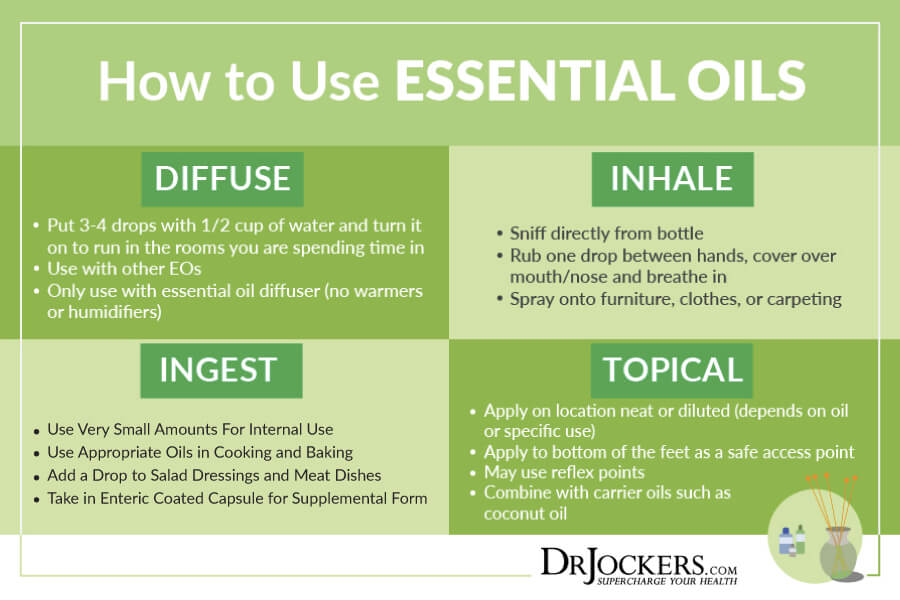
Mouth Taping
Changing how you breathe at night is important for reducing snoring. Most people chronically breathe out of their mouths. Mouth breathing can contribute to snoring and unrefreshing sleep.
Mouth breathing activates the sympathetic nervous system which is our fight or flight response. Activation of the sympathetic nervous system signals the production of greater amounts of stress hormones and elevates blood sugar. This can interfere with sleep and contribute to snoring.
Breathing out of the nose instead of the mouth activates the parasympathetic nervous system. This part of the nervous system signals rest, regeneration, healing, and digestion. Nose breathing lowers stress hormones, aids digestion and healing, and promotes relaxation. Relaxed throat muscles allow better airflow and can help reduce or prevent snoring.
In addition to snoring and unrefreshing sleep, signs that you are a mouth breather are bad morning breath, dry mouth/thirst in the morning, and poor oral hygiene issues. Mouth breathers have a greater bacterial load in their mouths which compromises the immune system making you more susceptible to chronic inflammatory conditions.
One way to train yourself to breathe from the nose rather than the mouth is to use mouth tape at night. My favorite mouth tape is the Micropore paper tape. For instructions on how to use mouth tape, watch the video below.
Use Breathe Right Strips
Congestion can occur when your nasal passages become inflamed allowing less air to pass through. Breathe Right nasal strips use a combination of gentle but strong adhesive and a unique reflex action to actually physically pull your nasal passage open.
Nasal strips are made of flexible, spring-like bands that fit right above the flare of the nostrils. The underside is adhesive so that once positioned on the nose, they stay there. As the bands attempt to straighten back to their original shape, they lift the sides of the nose and open the nasal passages.
This lifting action helps open inflamed sinus passages and makes it easier to breath. Nose strips provide relief for congestion due to colds, allergies, or a deviated septum and reduce snoring caused by nighttime nasal congestion.
Change Your Sleeping Position
Reducing snoring may be as easy as changing your sleep position. Sleeping flat on your back causes the throat to relax and block your airway. Elevating your head and sleeping on your side can prevent relaxed throat muscles from blocking your airway.
Elevating your head by about four inches makes breathing easier. It helps your tongue and jaw move forward during sleeping. You use a wedge pillow or towels underneath the mattress to elevate the head of the bed.
Sleeping on your side can also be very helpful to stop snoring. Using a tennis ball taped or sewn to the back of your pajamas or a body pillow are ways to maintain the side-sleeping position.
Practice Good Sleep Hygiene
While snoring can lead to sleep deprivation, not getting enough sleep can lead to further throat relaxation and cause snoring. Good sleep hygiene is important for reducing snoring and ensuring you have restorative sleep.
What you do during the day affects your sleep at night. Be sure to get outside in the sunlight during the day and consume a blood sugar balancing diet. It is also important to be smart about caffeine intake by using it early in the day in small quantities and cycling on and off caffeine.
Avoiding artificial light and blacking out your room with blackout curtains or a sleep mask can lead to more refreshing sleep. Other healthy sleep habits include turning off electronics and Wi-Fi at night, light stretching, practicing gratitude, journaling and prayer time, and spending time with family.
Having optimal levels of magnesium is important for sleep. Magnesium is a micronutrient that plans a critical role in stress and sleep by balancing blood sugar and relieve physical tension.
Magnesium also helps regulate melatonin and GABA levels in the brain, both of which are necessary for sleep. My favorite magnesium supplement is Brain Calm Magnesium which includes several bioavailable forms of magnesium, including magnesium L-threonate, the only form proven to cross the blood-brain barrier.
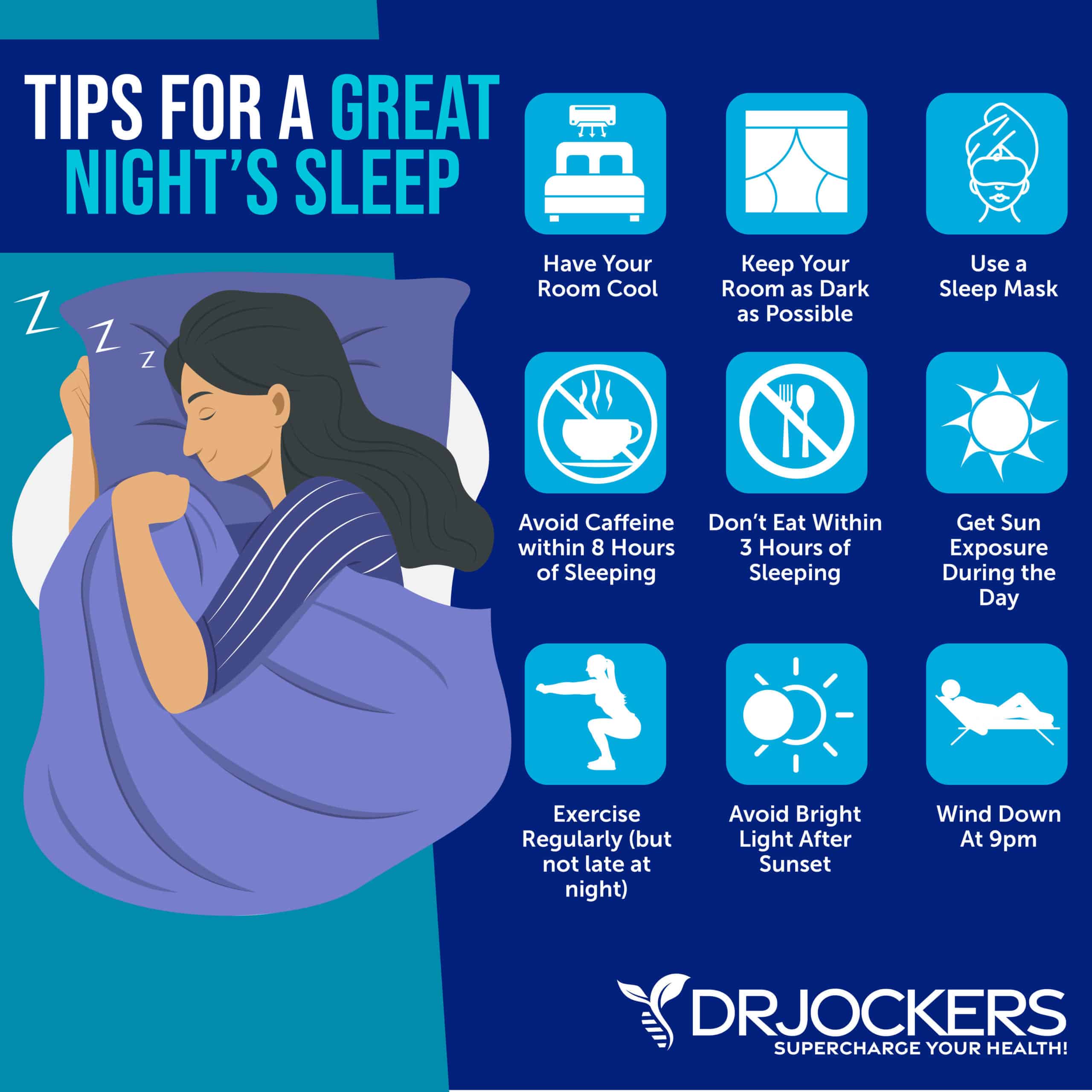
Take Care of Your Sinuses
Nasal congestion makes it difficult to breathe and can cause snoring. There are many things you can do to clear your sinuses and keep your nasal passages healthy.
Good hydration is important for moisturizing mucous membranes and keeping mucous thin to drain easier. You should consume at least one half of your weight in ounces of clean, filtered water daily. Herbal teas are excellent for sinuses. Teas can minimize congestion and thin mucous.
Two of the best foods for your sinuses are garlic and onions. Garlic and onions are allium vegetables which are rich in allicin, vitamin C, vitamin B6, selenium, and naturally occurring glutathione. These nutrients act as powerful antioxidants in the body to support the immune system and reduce inflammation. Other nutrients which support healthy sinuses are zinc and vitamin D.
Using a humidifier and irrigating your nasal passages can be helpful. Nasal irrigation with a salt and water solution flushes out the nasal passages. Studies have shown that nasal irrigation reduces inflammation in the nasal cavities and is an effective treatment for sinus issues (7).
A humidifier adds moisture to the air. The moist air helps to moisten the sinuses and soothe the tissues in the nasal passages. This prevents dryness in the nose and throat which can lead to irritation. Use these strategies to clear sinus congestion and open your airway to prevent snoring.
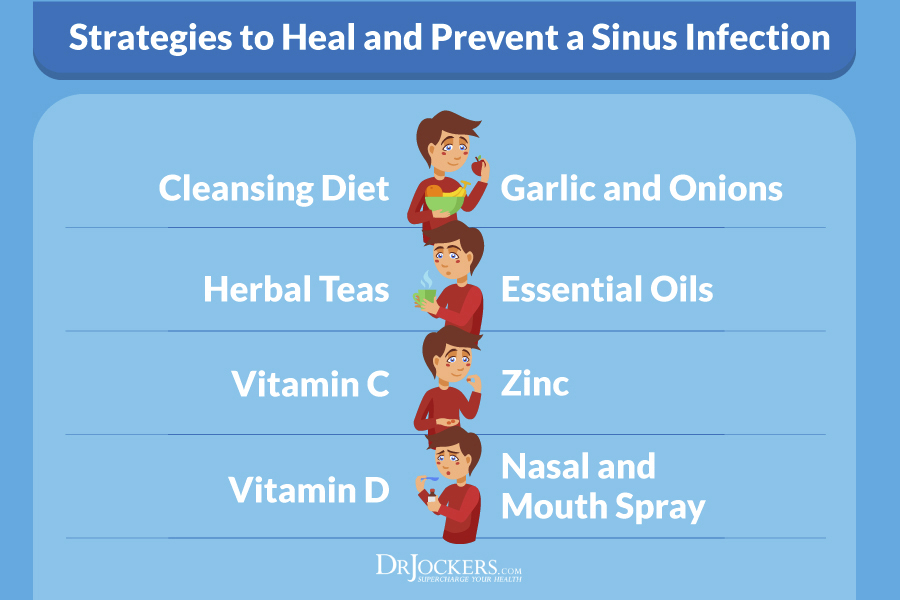
Avoid Alcohol, Smoking, and Sedatives
Consuming alcohol before bedtime can lead to snoring. Alcohol relaxes the throat muscles and decreases your natural defenses against airway obstruction.
As if you need one more reason to stop smoking, it contributes to snoring. Smoking or exposure to second-hand smoke (including electronic cigarettes) relaxes the throat muscles and causes congestion in the nasal passages and lungs.
Antihistamines, sleeping pills and other sedatives relax the throat muscles and may increase snoring. These medications also have other negative side effects. To stop snoring, it is important to avoid alcohol, smoking, and sedative medications.
Summary on Snoring
Snoring is a common sleep problem that affects both men and women. It occurs when your throat vibrates as you breathe creating a noisy sound.
Snoring can lead to poor sleep and sleep deficiencies. Sleep deficiencies are associated with many health problems. Snoring can also affect your relationship with your partner. There are several causes and factors that lead to snoring. Many of these factors are lifestyle factors that can be improved with natural remedies.
One of the most important natural remedies to stop smoking is consuming an anti-inflammatory diet. It is critical to eliminate any foods to which you may be sensitive or intolerant. Losing excess weight, intermittent fasting, consuming smaller meals at night, and avoiding dairy can reduce or eliminate snoring. Other helpful strategies are diffusing essential oils, mouth taping, changing your sleep position, good sleep hygiene, and avoiding alcohol, smoking and sedatives.
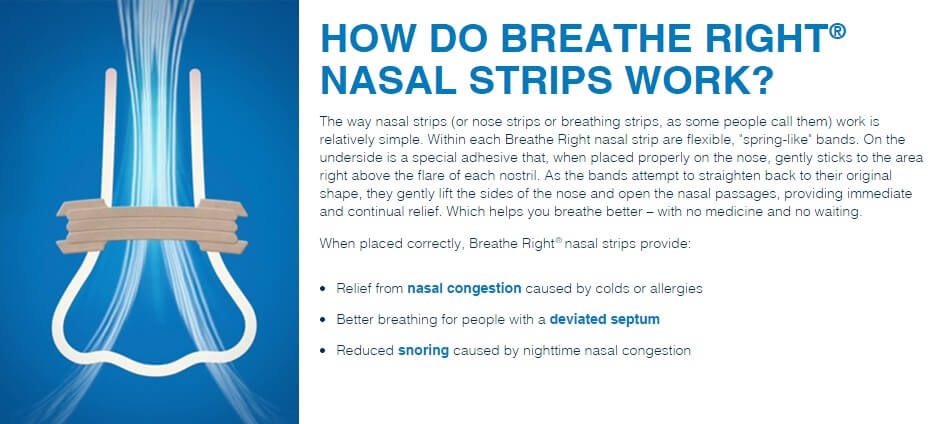



Vit A 10,000IU helped me soak air into my lungs and stopped my sleep apnea. Raising oxygen in my brain helps me sleep. NO gluten/GMO/dairy/soy/sugar/food with a label..taking vitamins/good oils/minerals…probiotic…LDN..detoxing help me. When Vit A was low Zn/Biotin didn’t work etc. Vit A help thyroid/raising oxygen burning. Vit B12 with intrinsic factor/fish oil/Mg/Zn/Vit D3/sunlight etc may help. I had to try to sleep sitting up when I was low in Vit A. Each vitamin/nutrient is very important. No gluten etc helps heal the gut lining so more nutrients absorb.